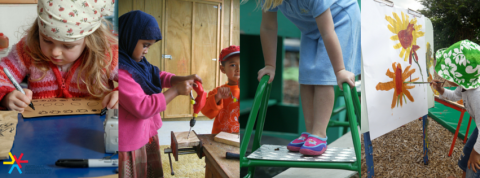“Play is the highest form of research” – Albert Einstein
At Auckland Kindergarten Association, we believe that play is vital for learning in the early years. Play may seem simple, yet it is profound to a child’s development. Play makes learning something that happens naturally and joyfully, when a child laughs and wonders, explores and imagines. Children don’t even realise that they are learning because they’re so interested in what they’re doing.
New Zealand’s national curriculum Te Whāriki is designed to cater for the distinctly different learning needs of young children. It is widely known that children between birth and eight years of age learn differently from older children and play is a key part of that learning. Our carefully planned learning environments are designed with this in mind. Young children need “hands-on” learning experiences, where they can experiment, create, try things out, discover, explore and test out ideas in their own areas of interest. Our kindergartens acknowledge and support all aspect of a child’s learning – intellectual, physical, emotional, social and cultural.
Before children are ready to learn, they need to feel like they belong in an early childhood centre or kindergarten. They need to feel safe and know that they can trust the adults in the environment to look after their wellbeing. Once they feel secure and happy, they soon find something to engage their interest. They may initially choose to play on their own, but over time they become more confident to participate in the social group and make friends.
Play allows children to act out what they know from the “real world”. They copy the things that adults do (such as feeding a doll, pretending to talk on the phone, ironing, cooking, writing, reading, building roads in the sandpit). This is how they “make sense” of the world and demonstrate their knowledge in action. Through play they also make discoveries – for example in outdoor play children learn scientific concepts of floating/sinking or theories about the natural world. Mathematical concepts of shape, measurement and number can be learnt in the sandpit.
Our skilled teachers act with knowledge and purpose to make sure young children acquire the skills and understanding they need to succeed. They keep in mind the key goals for children’s learning and development in all domains by creating supportive environments, planning curriculum, and selecting from a variety of sensitive teaching strategies that best promote each child’s thinking and skills. They extend children’s thinking by posing challenging questions, and provide extra resources to support their interests and deepening learning experiences.
Play is not the only form of learning in our kindergartens. Children also participate in planned group experiences, such as “mat-time”, music, art activities, cooking, projects and celebrations.
Teachers encourage the development of useful learning dispositions, such as being curious, interested, responsible, thoughtful, kind, focused and communicative – these ‘dispositions’ are just as important for children’s learning as academic knowledge and skill and are useful not only for school but for life!
Kindergarten children learn how to learn. They learn to try new things, make mistakes (and learn from them), problem-solve, ask questions and take calculated risks.
Playful learning is fun, and it’s powerful. Please join us in fostering the undeniable, incredible, exceptional power of play wherever the setting.
“Education is not a preparation for life, it is life itself” John Dewey

